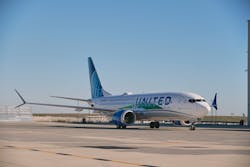United Airlines operates first commercial flight with 100% Sustainable Fuel
United Airlines operated the first commercial aircraft using 100% sustainable aviation fuel (SAF) from Chicago's O'Hare International Airport and to Washington, D.C.'s Reagan National Airport on Wedneday.
The airline company operated the flight in partnership with Boeing, CFM International, Virent and World Energy. Executives of each of those firms were present on the flight, which carried 100 passengers.
The new United 737 MAX 8 used 500 gallons of SAF in one engine and 500 gallons of conventional jet fuel in the other engine, demonstrating that there was no operational difference between the two, setting the stage for scalable uses of SAF by all airlines.
SAF is an alternative fuel made using non-petroleum feedstocks such as waste products. The U.S. Department of Energy says the SAF’s performance is the same as petroleum-based jet fuel but only has a fraction of its carbon footprint, although currently airlines are only permitted to use a maximum of 50% SAF on board.
"Today's SAF flight is not only a significant milestone for efforts to decarbonize our industry," United CEO Scott Kirby said, "but when combined with the surge in commitments to produce and purchase alternative fuels, we're demonstrating the scalable and impactful way companies can join together and play a role in addressing the biggest challenge of our lifetimes."
Meanwhile, United Airlines also announced a second round of participants in its Eco-Skies Alliance program. The new participants include Microsoft, Salesforce, Zurich North America, Biogen, Bolloré Logistics, Palo Alto Networks and more.
The program was launched in April 2021 and has contributed to the purchase of 7 million gallons of SAF in a year. The fuel can reduce GHG emissions by nearly 80% compared to conventional jet fuel.
The SAF flight is in line with United Airlines’ goal to become 100% green by 2050 without relying on carbon offsets.
About the Author
EnergyTech Staff
Rod Walton is head of content for EnergyTech.com. He has spent 17 years covering the energy industry as a newspaper and trade journalist.
Walton formerly was energy writer and business editor at the Tulsa World. Later, he spent six years covering the electricity power sector for Pennwell and Clarion Events. He joined Endeavor and EnergyTech in November 2021.
He can be reached at [email protected].
EnergyTech is focused on the mission critical and large-scale energy users and their sustainability and resiliency goals. These include the commercial and industrial sectors, as well as the military, universities, data centers and microgrids.
Many large-scale energy users such as Fortune 500 companies, and mission-critical users such as military bases, universities, healthcare facilities, public safety and data centers, shifting their energy priorities to reach net-zero carbon goals within the coming decades. These include plans for renewable energy power purchase agreements, but also on-site resiliency projects such as microgrids, combined heat and power, rooftop solar, energy storage, digitalization and building efficiency upgrades.
